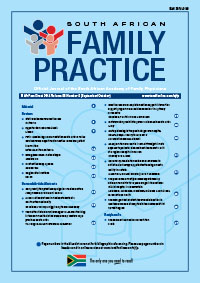Self-prescription practices by Nigerian medical doctors
Keywords:
drug prescription, health-seeking behaviour, medical doctors, Nigeria, self-prescribing, self-treatment
Abstract
Background: Self-prescription by physicians is a form of self-care that has generated considerable controversy in recent years. The prevalence of self-prescription practices by physicians has been widely studied in North America, Europe and Asia. Few studies on physician self-prescribing and prescribing for family members have been carried out in Nigeria. The primary aim of this study was to investigate the prevalence of self-prescription by medical doctors in Nigeria. Method: The study was carried out on medical doctors working in two public sector tertiary healthcare facilities in Nigeria; the Federal Medical Centre, Ido-Ekiti, and the University of Ilorin Teaching Hospital, Ilorin. This was a questionnaire-based, cross-sectional survey of different categories of medical doctor working in two healthcare institutions. A semi-structured questionnaire was used to collect demographic data on the respondents, self-prescription practices, prescribing for family and friends, reasons for self-prescription and the type of medications usually prescribed. Results: One hundred and thirty-two doctors were enrolled in the study, giving a response rate of 53.0%. One hundred and twenty-seven respondents (96.2%) usually prescribed medications for themselves, 87 (91.6%) prescribed for their spouses and 72 (80.0%) for their children. One hundred and seventeen (89.3%) of the medical doctors had prescribed by telephone, 92 (70.8%) had informally asked colleagues for a prescription, while 80.9% of them had refused to prescribe for family members mostly because of the need for a physical examination (68.2%). Seventy-six respondents (61.3%) were of the opinion that self-prescription and prescription for family members was unethical. Antimalaria drugs, analgesics and antibiotics were the most commonly prescribed drugs. Conclusion: The findings from the two clinical centres in Nigeria demonstrated that self-prescription by medical doctors was highly prevalent. Appropriate strategies are necessary to curtail this potentially harmful practice. A larger study across all geopolitical regions is needed to fully assess the prevalence of this practice.
Published
2015-01-30
Section
Original Research
By submitting manuscripts to SAFP, authors of original articles are assigning copyright to the South African Academy of Family Physicians. Copyright of review articles are assigned to the Publisher, Medpharm Publications (Pty) Ltd, unless otherwise specified. Authors may use their own work after publication without written permission, provided they acknowledge the original source. Individuals and academic institutions may freely copy and distribute articles published in SAFP for educational and research purposes without obtaining permission.

